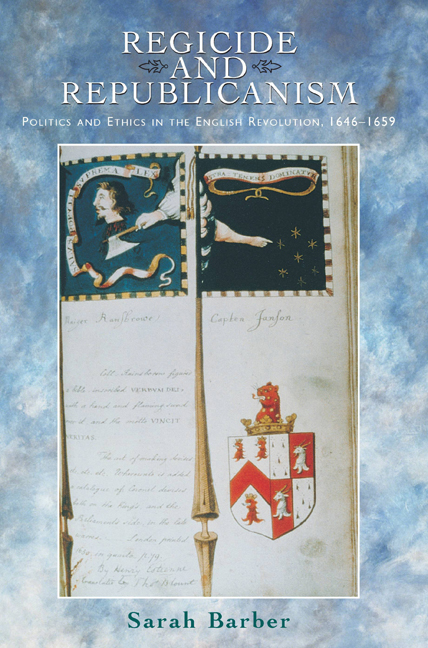Book contents
- Frontmatter
- Contents
- Preface
- List of Abbreviations
- Introduction: Regicide and Republicanism
- 1 Unparliamentary Language and the Dignity of the Crown
- 2 ‘A Mere Man’: Charles Levelled
- 3 The Expense of Blood and Treasure
- 4 King Ahab
- 5 Queen Justice
- 6 Government New Modelled?
- 7 The Engagement of Loyalty
- 8 The Active and the Passive Life
- Epilogue: The Good Old Cause
- Select Bibliography of Printed Sources
- Index
Introduction: Regicide and Republicanism
Published online by Cambridge University Press: 03 October 2020
- Frontmatter
- Contents
- Preface
- List of Abbreviations
- Introduction: Regicide and Republicanism
- 1 Unparliamentary Language and the Dignity of the Crown
- 2 ‘A Mere Man’: Charles Levelled
- 3 The Expense of Blood and Treasure
- 4 King Ahab
- 5 Queen Justice
- 6 Government New Modelled?
- 7 The Engagement of Loyalty
- 8 The Active and the Passive Life
- Epilogue: The Good Old Cause
- Select Bibliography of Printed Sources
- Index
Summary
This book describes regicide and republicanism as they are examples of political practice, taking as its particular context the regicide of Charles Stuart and the subsequent republican government known as the Commonwealth. The execution of Charles I and the establishment of the Commonwealth government by the Rump parliament were consequential in a chronological sense: Charles was executed on 30 January 1649, and between 1649 and 1653 England was a republic. In the specific context of England in 1649, republicanism was also a political consequence of regicide: one led to the other. I shall argue, however, that although regicide and republicanism were, to a certain extent, dependent on each other, their intellectual parentage was different. In order to demonstrate this, the practice of regicide and republican government is analysed within two more general interpretations of political philosophy which underpinned them: an ethical critique of magistracy, and the distinction between the magistrate as a person and magistracy as an office.
Authority relies on a general acceptance of political agency, both in terms of the medium through which the polity disseminates authority — statute and law — and the agents who are entrusted with making political decisions. Placing one's trust in the magistracy — at every level, from village constable to king — is a political action, the performance of which contains two distinguishable elements: a decision to abide by the laws and obedience (and obeisance?) to the individuals who implement them. The ability or desire to distinguish between the two gives rise to a fundamental difference of political view. Was authority conveyed by the laws or was it owed to the people who constituted the autho- rities?Law might be absolute, abstract and binding on all, or a construct, implemented by the good and trustworthy. Was government necessary because all people were equal, either equally wise or equally foolish, or was government required because some were more wise than others? Were all people Hable to be corrupted by the temptations of office, and did the nature of some offices offer more temptations than others? A theory of contract Res beneath these questions. Contract, in turn, is underpinned by an ethical evaluation of people in general and magistrates in particular, informed by voluntarism.
- Type
- Chapter
- Information
- Regicide and RepublicanismPolitics and Ethics in the English Revolution, 1646–1659, pp. 1 - 10Publisher: Edinburgh University PressPrint publication year: 2020



